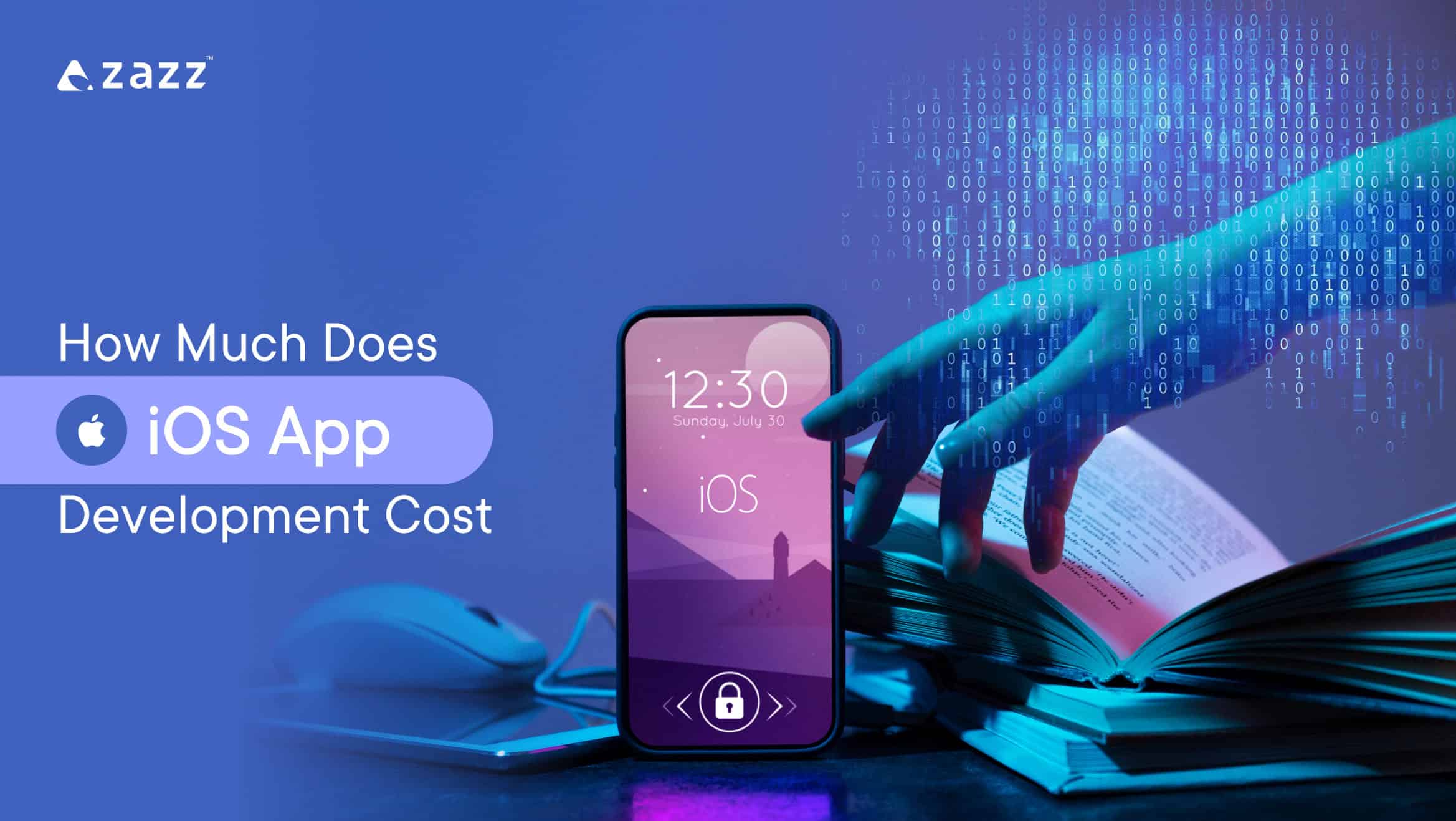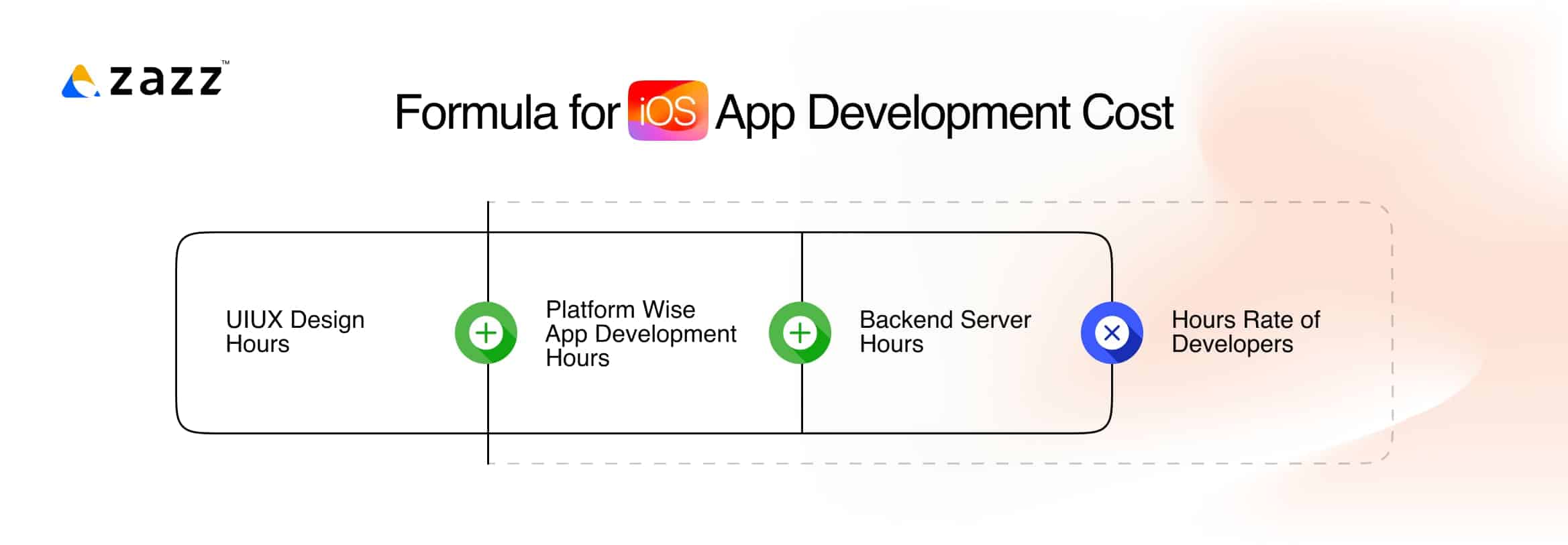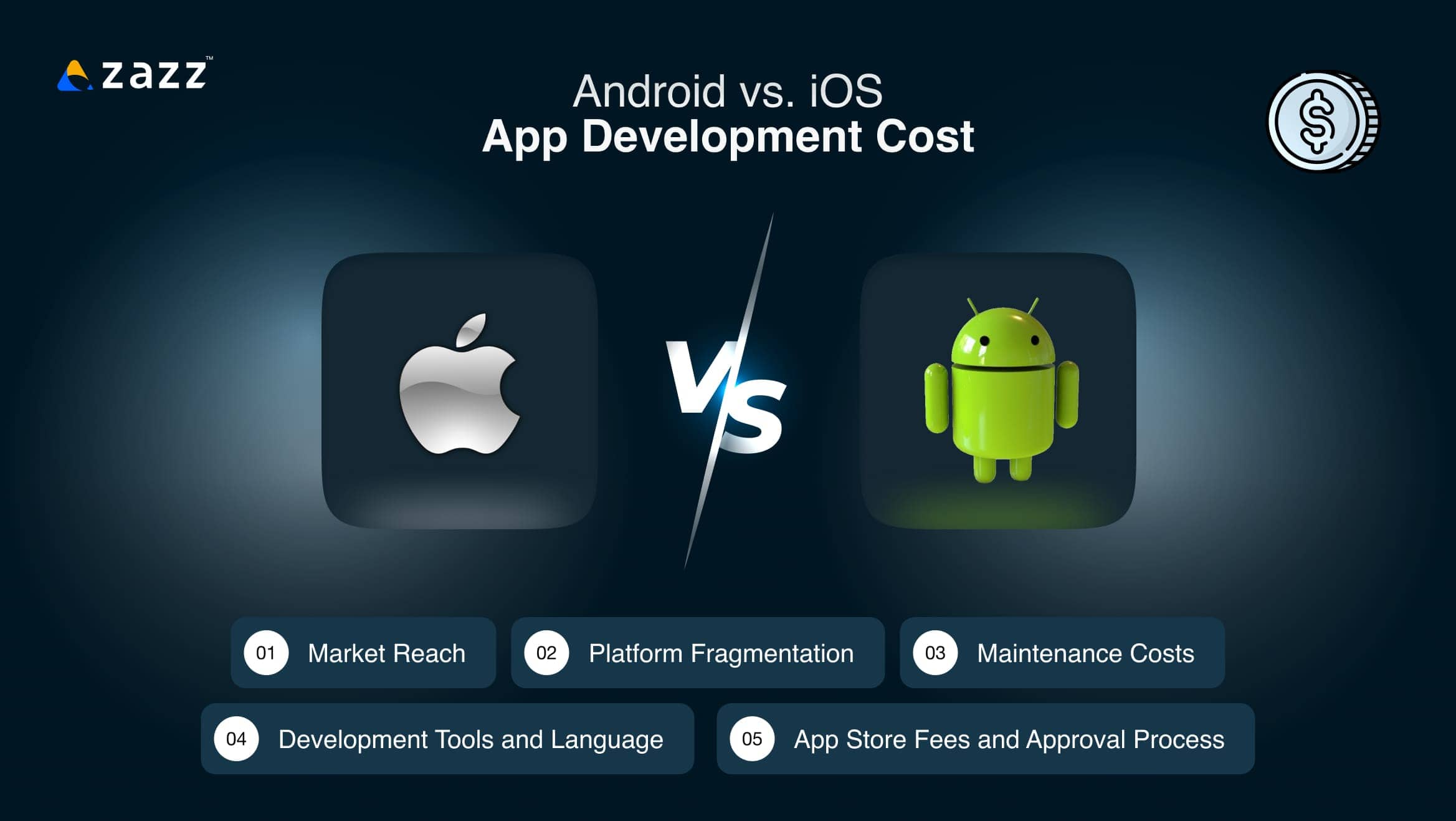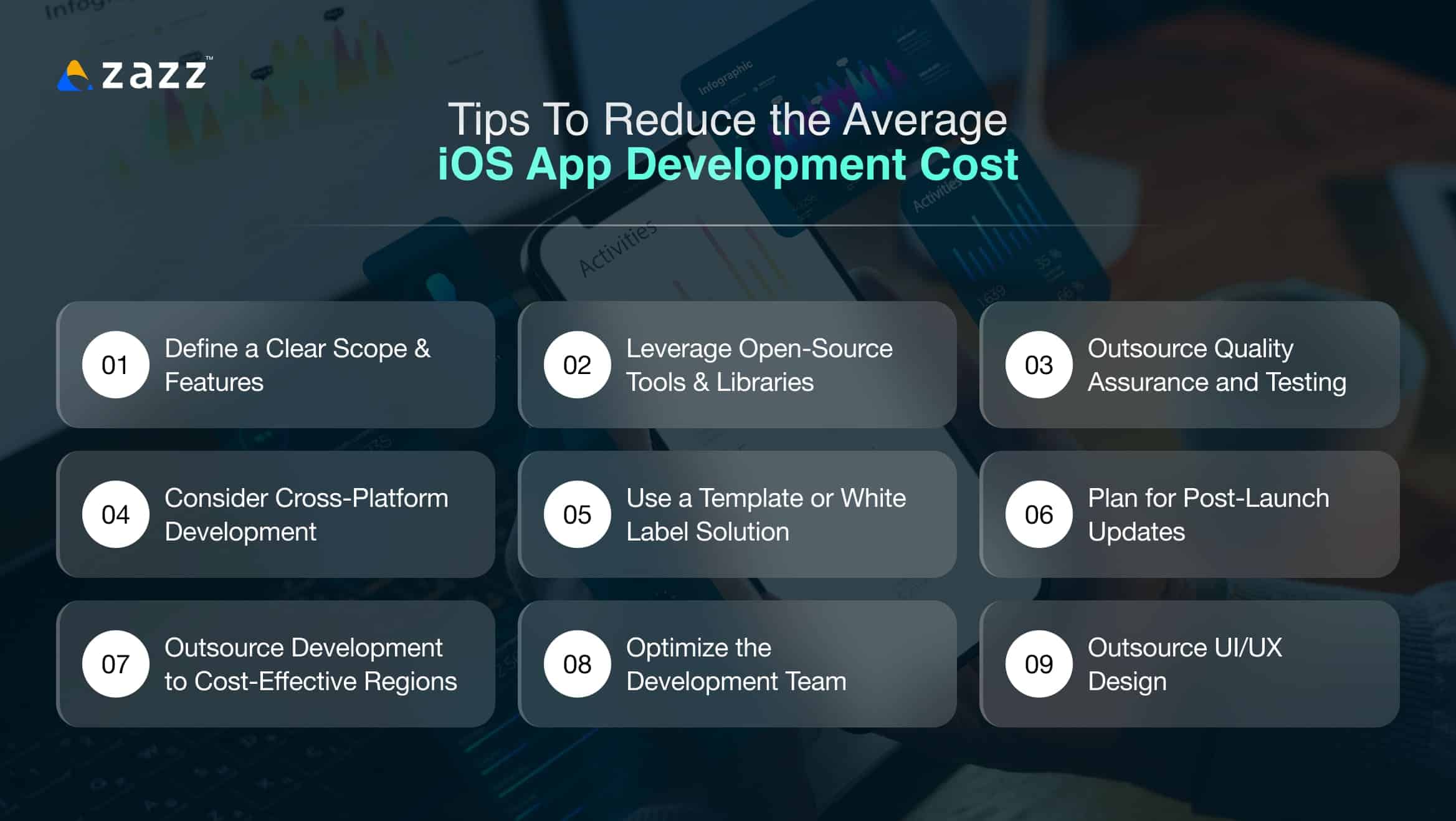
Table of Content 1. Understanding the Basics of iOS App Development
2. Breakdown of the Average iOS App Development Cost in 2025
3. Brief Analysis of Android vs. iOS App Development Cost
4. Average Cost of iPhone App Development by App Type
5. In-House Development vs. Outsourcing: Impact on Cost
6. Tips To Reduce the Average iOS App Development Cost
7. Key Takeaways
The world of mobile apps has evolved significantly over the past decade, with iOS applications leading the way due to their unmatched user experience, reliability, and the prestige of being hosted on the Apple App Store. As we move into 2025, businesses are looking to invest in iOS app development more than ever, but one question that continues to crop up is: “How much does it cost to create an app for iPhone?” Understanding the factors that influence iOS app development cost can help you make informed decisions for your project.
In this blog, we will explore the average cost of iOS app development in 2025 and break down the various aspects that contribute to the overall iPhone app development cost. From simple utility apps to complex, feature-rich apps with integrated AI and real-time features, the costs can vary considerably. Let’s dive into the details and find out what goes into determining the cost to build iOS app and how you can plan for your own project.
Understanding the Basics of iOS App Development
Before we dive into the numbers, it’s essential to understand what iOS app development entails. Developing an iOS app means creating an application that runs on Apple devices like iPhones, iPads, and Macs. The development process includes several stages:
- Ideation and Planning: Initial concept development, market research, and defining the app’s features.
- Design: Creating the user interface (UI) and user experience (UX) design.
- Development: The actual coding of the app, including the back-end and front-end.
- Testing: Ensuring the app works as intended across different devices.
- Launch and Maintenance: Publishing the app on the App Store and providing ongoing updates.
The cost to create an app for iPhone will vary depending on the complexity of each of these stages. Factors such as the number of features, app design, the development team’s location, and timeline all contribute to the iOS development cost.
Related reading: Best iOS App Development Programming Languages
Factors that Impact iOS App Development Cost
1. App Complexity
The more complex the app, the higher the iPhone app development cost. For example, a simple utility app with basic functions will cost much less than an app with multiple user profiles, real-time updates, or integrated payment systems. Complex features like AI, machine learning, or Augmented Reality (AR) can significantly raise the iOS app development price.
2. Design
Design is one of the key elements of any iOS app, as Apple users expect a high-quality and intuitive user interface (UI). A simple design can reduce costs, but sophisticated UI/UX design for a visually appealing experience can raise the cost for iPhone app development.
3. Development Team’s Location
The cost to develop an iPhone app also depends on where your development team is located. In North America and Western Europe, apple app development costs tend to be higher due to the high hourly rates of developers. In contrast, offshore development teams in Asia or Eastern Europe may offer more affordable rates, although this may come with language barriers and potential differences in work culture.
4. App Maintenance and Updates
The cost to build an app for iPhone doesn’t end with the launch. Regular updates, bug fixes, and app maintenance add to the ongoing iPhone application development cost.
5. App Features and Functionalities
More features mean more development time, which increases the cost for iphone app development. Features such as geolocation, social media integration, push notifications, in-app purchases, or integration with third-party APIs all add to the development time and cost
Formula for calculating iOS app development cost :

Breakdown of the Average iOS App Development Cost in 2025
In 2025, the average cost of iOS app development can range widely, depending on the factors we’ve outlined above. However, based on industry research and trends, we can estimate the iOS development cost across different types of apps:
Simple iOS App Development
For a simple app with limited features (think a basic utility app or a simple business tool), the cost to create an app for iPhone can range between $20,000 and $50,000. These apps are typically lightweight, with limited functionality, and are quicker to build and test.
Mid-Range iOS App Development
For apps that require moderate complexity, including advanced UI/UX, basic backend integration, and API connectivity (like a social media app, a fitness tracker, or a dating app), the iPhone app development cost can fall between $50,000 and $150,000. This range reflects the additional time spent on design and development.
High-End iOS App Development
At the higher end of the spectrum, if you want to build an app with advanced features like real-time data processing, push notifications, AI or machine learning capabilities, or integration with hardware, the iphone application development cost could easily exceed $200,000. These apps require more time, more advanced coding skills, and extensive testing to ensure everything works smoothly.
Hidden cost involved in iOS app development
Don’t forget that the cost to build ios app doesn’t end with the development phase. After the app is launched, it requires maintenance, updates, and the occasional bug fixes to ensure compatibility with new iOS versions. Ongoing maintenance typically costs about 15-20% of the initial development cost annually.
Related reading: How to Find Best Company to Start My iOS App Development Project?
Brief Analysis of Android vs. iOS App Development Cost

When deciding whether to develop an Android or iOS app, one of the most significant considerations is the development cost. Both platforms have their own unique development processes, tools, and market requirements that affect the overall cost of creating an app. Let’s dive into a brief analysis of the Android vs. iOS app development cost to help you make a well-informed decision.
1. Development Tools and Language
iOS App Development Cost: iOS app development typically involves using Swift or Objective-C programming languages and Apple’s proprietary development environment, Xcode. While Xcode is free to use, iOS development generally requires a Mac machine, which can be expensive. Additionally, if you are building a native iOS app, you’ll be focusing only on the iOS ecosystem, which is more streamlined but may require higher-quality development resources. The ios app development price can be higher because of the emphasis on polished design, user interface, and app store requirements.
Android App Development Cost: Android development relies on Java or Kotlin and is primarily done through Android Studio, an open-source tool. Android app development doesn’t have the same hardware requirements as iOS, and the platform itself supports a broader range of devices. While the development tools are free, Android’s fragmented ecosystem, with multiple screen sizes, OS versions, and device types, can complicate development and testing, increasing the cost to build an app for Android.
2. Platform Fragmentation
iOS: Apple’s devices are limited to a relatively small number of models compared to Android, and the iOS ecosystem tends to have fewer variables. As a result, iOS developers can focus on a specific set of devices and OS versions, leading to faster development times and potentially lower overall iphone app development cost for certain types of apps
Android: Android, on the other hand, is known for its fragmentation. Developers need to account for a wide variety of devices, screen sizes, OS versions, and manufacturers (Samsung, Google, Huawei, etc.). This means additional testing and possibly extra development time, which increases the android app development cost. The ios development cost tends to be more predictable and often lower in comparison due to the more standardized hardware and software ecosystem of Apple.
3. App Store Fees and Approval Process
iOS: Apple’s App Store charges a developer fee of $99/year for an individual developer account, and all apps must go through a strict approval process. While this ensures higher app quality, it can be time-consuming and add to the overall apple app development cost, especially if multiple iterations are needed before approval.
Android: Google Play charges a one-time $25 fee for a developer account, and the app review process is generally less stringent and quicker. This means android app development cost can be lower in the initial stages, as developers may face fewer delays.
4. Maintenance Costs
iOS Maintenance: Since Apple devices have fewer variations and iOS updates are more controlled, maintenance and updates are easier and less expensive compared to Android. As a result, the average cost of iOS app development often includes a predictable maintenance cycle.
Android Maintenance: On the other hand, maintaining an Android app can be costlier due to the variety of devices and Android OS versions in circulation. Updating apps to work across different devices and versions might require more effort and time, leading to a higher android app development price.
5. Market Reach
iOS: iOS users tend to be more affluent and are generally more willing to spend money on apps, which can lead to higher revenue potential for iOS apps. However, the iphone app development cost can be higher, so this needs to be balanced with the expected return on investment.
Android: Android has a larger global market share, particularly in regions like Asia and Africa. While the app revenue potential per user might be lower, the larger user base might compensate for this. The cost for Android app development can be lower, but the return on investment might require careful market targeting.
Average Cost of iPhone App Development by App Type
The average cost of iPhone app development varies based on the type of app. Here are some examples of popular app categories and their expected costs:
Social Media Apps
Developing a social media app like Instagram or Twitter can be quite expensive due to the need for real-time updates, live feeds, and extensive backend support. The cost to create an app for iPhone in this category can range from $100,000 to $300,000.
E-Commerce Apps
E-commerce apps with integrated payment systems, product listings, and customer profiles generally cost between $50,000 and $150,000 to develop. High-end, feature-rich e-commerce platforms can push this cost up even further.
Gaming Apps
Cross-platform technology has advanced significantly, allowing even Mac users to play Windows games on their devices. However, mobile development largely remains its own ecosystem, with game costs varying greatly based on complexity. Simple 2D games may cost around $30,000, while high-end 3D games can exceed $500,000. The iOS development cost depends primarily on the graphics, animations, and game mechanics.
Healthcare Apps
Healthcare apps that integrate with wearable devices, track patient data, or provide telemedicine services can cost anywhere from $75,000 to $250,000.
Enterprise Apps
Enterprise-grade apps that streamline internal operations, provide reporting tools, or track data across departments can cost between $100,000 and $500,000, depending on the complexity.
Related reading: Common Issues Faced By Developers While Developing an iOS App
In-House Development vs. Outsourcing: Impact on Cost
The cost to build an app for iphone can also depend on whether you choose to develop the app in-house or outsource it to a development company. Each approach has its pros and cons:
In-House Development
When you hire an in-house team, you gain more control over the development process and can easily communicate your needs and vision. However, this comes at a high cost because you will need to hire skilled developers, designers, and project managers. Salaries for iOS developers in the U.S. can range from $80,000 to $150,000 per year, which can significantly increase the overall cost for iphone app development.
Additionally, in-house teams typically have limited capacity to scale up quickly if needed, which can delay the timeline and increase costs in the long run.
Outsourcing Development
Outsourcing to a development agency or hiring freelance developers can significantly reduce the cost to make an iOS app. For instance, offshore developers from regions like Eastern Europe or Asia can charge between $25 and $50 per hour, compared to U.S.-based developers who may charge $100 to $200 per hour.
While outsourcing can lower the cost to build an app for iPhone, it may come with challenges like time zone differences, communication barriers, and a potential lack of cultural alignment. It’s important to thoroughly vet any outsourcing partner to ensure they have the necessary expertise and a track record of successful iOS app development.
Outsource your iOS app development to Zazz- America’s leading Mobile app development company. Get your app developed just in time and just the way you want it without any challenges
Tips To Reduce the Average iOS App Development Cost

Developing an iOS app can be a significant investment, but there are several strategies you can employ to lower the overall average iOS app development cost without compromising quality. Here are some actionable tips to help you save money during the development process:
- Define a Clear Scope and Features One of the primary reasons for rising development costs is scope creep, where additional features and changes are added mid-project. To avoid this, ensure that your app’s features and functionalities are clearly defined from the outset. Prioritize the most essential features for the minimum viable product (MVP) to keep the cost to build ios app in check. You can always add extra features in later versions after the app is launched.
- Consider Cross-Platform Development Instead of building a separate app for iOS and Android, consider opting for cross-platform development using frameworks like Flutter, Xamarin, or React Native. These allow you to write a single codebase that works across both platforms, significantly reducing the cost to create an app for iPhone as well as the cost to build an app for Android.
- Outsource Development to Cost-Effective Regions IT Outsourcing app development to countries with lower labor costs, such as Eastern Europe, India, or Southeast Asia, can drastically reduce the overall iOS app development price. While it’s important to ensure the developers you hire are skilled and experienced, outsourcing to more affordable regions can significantly lower the iphone app development cost.
- Leverage Open-Source Tools and Libraries Instead of building everything from scratch, take advantage of open-source tools, libraries, and pre-built components. Many of these can handle routine tasks like database management, user authentication, and third-party integrations, allowing your development team to focus on the unique aspects of your app. This can help lower the iphone application development cost by saving both time and money.
- Use a Template or White-Label Solution For simple apps or those with standard functionality, using a pre-built app template or a white-label solution can significantly reduce development time and costs. You can customize these solutions to match your branding and specific features, saving you the expense of starting from scratch. Though this approach may not be suitable for more complex apps, it’s an excellent way to minimize the ios development cost for simpler projects.
- Optimize the Development Team Carefully select your development team and ensure they are well-versed in iOS development best practices. Hiring experienced developers who are proficient in tools like Swift and Xcode can help speed up the process and reduce mistakes that may lead to additional costs. Smaller, highly skilled teams can also be more efficient, helping you manage the iphone app development cost without sacrificing quality.
- Outsource Quality Assurance and Testing Testing and quality assurance (QA) are essential to a successful app, but they can also be expensive if handled entirely in-house. Consider outsourcing these tasks to specialized teams that can focus solely on testing your app’s performance, security, and usability. This can help reduce the cost for iphone app development while ensuring that the app is thoroughly tested before launch.
- Plan for Post-Launch Updates After your app is launched, it will need regular updates and maintenance. Instead of overestimating the cost of post-launch support, plan for a set budget and consider offering ongoing maintenance as part of the development contract. By planning ahead, you can avoid unexpected costs later on, ensuring that your ios app development cost remains manageable in the long run.
- Outsource UI/UX Design While design is an integral part of the iOS app development process, outsourcing the UI/UX design to a freelance professional or a design agency can reduce costs. Designers may have their own rates, but their experience allows them to quickly deliver attractive, user-friendly interfaces without adding too much to the overall ios development cost.
By implementing these strategies, you can reduce the average cost of iOS app development and keep your project within budget. Whether you’re a startup or an established business, the right planning and approach can help you bring your iOS app to life without breaking the bank.
Related reading: iOS App Development Process
Want to build an app within your budget and with the best app development team? Zazz is here for you
Key Takeaways:
The iOS app development price in 2025 can vary significantly depending on several factors, including the complexity of the app, the features you want to include, the location of your development team, and the timeline you’re working with.
- Simple apps can cost between $20,000 and $50,000.
- Mid-range apps typically range from $50,000 to $150,000.
- Complex, high-end apps can exceed $200,000.
When considering the cost for iPhone app development, it’s also important to remember ongoing maintenance and the need for periodic updates. Outsourcing development may be a more affordable option for those looking to reduce the iphone app development cost, while in-house teams offer greater control but at a higher price.
Ultimately, understanding the various factors that contribute to iOS development cost will help you make better decisions when planning your app development project. Whether you’re a startup looking to launch your first app or an enterprise looking to create a custom solution, estimating the cost to create an app for iPhone will help you budget more effectively and set realistic expectations.
By keeping these factors in mind, you can ensure that your iOS app development project stays within budget while delivering the features and quality that Apple users demand. | CTA: How can Zazz help you in your app development? From concept to launch to post-deployment maintenance, Zazz provides an end-to-end app development service, relieving you off the burden |
Frequently Asked Questions
The cost to create an app for iPhone is influenced by factors like app complexity, design, development team location, backend infrastructure, and testing needs. More complex features and custom designs will increase the ios app development price, while offshore development can reduce costs.
iOS app development tends to be more expensive due to Apple’s strict app approval process and higher hardware costs. Android development is generally more complex because of device fragmentation, but iOS development often involves higher upfront costs and more polished design, which drives up the iphone app development cost.
In 2025, the average cost of iOS app development varies:
- Basic apps: $20,000–$50,000
- Medium apps: $50,000–$150,000
- Complex apps: $150,000–$500,000 or more. The cost depends on features, functionality, and developer location.
To reduce costs, focus on essential features first (MVP), outsource to cost-effective regions, use cross-platform development tools, leverage open-source libraries, and plan future updates efficiently. This helps lower the ios app development price.
Developing for iPhones is typically cheaper than iPads due to smaller screen sizes and simpler UI requirements. Developing for both devices increases costs slightly due to design and testing efforts for compatibility.
Custom iOS apps are more expensive, ranging from $50,000 to $200,000 due to unique design and features. Using a pre-built template is cheaper, usually costing $10,000 to $30,000, but offers limited customization.











